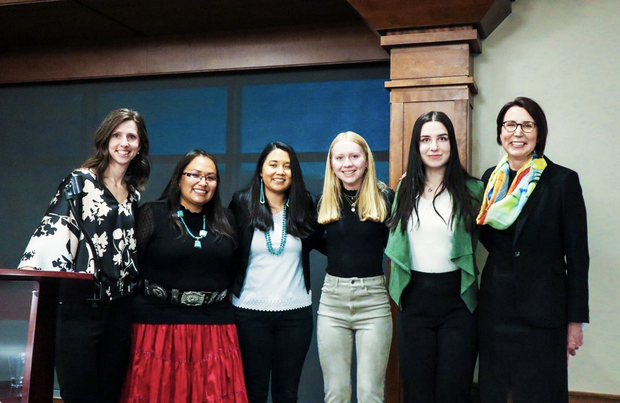
NDSU students were part of the winning team at the regional Map the System competition sponsored by the Center for Entrepreneurship and Family Business at NDSU. The team will advance to present their project, “Water is Life: Water Access in the Navajo Nation,” at the global finals sponsored by the Skoll Centre for Social Entrepreneurship at Oxford University in Oxford, England.
Abbie Brekke, a biochemistry major at NDSU, is the team leader. Other team members include NDSU Master of Public Health student Leonela Nelson, University of North Dakota Master of Public Health student Taylor Billey and Teegan Nordstrom, a cognitive science major at McGill University in Montreal, Quebec, Canada. The team was advised by Stefanie Meyer, director of accreditation and assistant professor of practice in public health at NDSU.
“Our system would not have been possible without tenacity and diversity,” said Brekke. “We are a group of four women across two countries and three time zones, which posed difficulty. But we are also a diverse group that came together and listened and learned from each other, and this was really key to our success.”
The team’s project explored the struggles that the Navajo Nation’s Diné people have trying to access a clean, reliable water source. Navajo Nation spans more than 27,000 square miles across three states in the southwestern U.S.
Nelson and Billey are indigenous women from Navajo Nation who live and work with water access challenges on a daily basis. Their personal experience brought direct insights important for systems-thinking, such as understanding the cultural importance of water and the impacts of settler colonialism.
Map the System challenges students to use systems-thinking to understand complex issues. Rather than a standard pitch competition, it is designed to foster the discovery process and encourage a learning-first approach to social change.
The Map the System competition was brought to NDSU by Onnolee Nordstrom, NDSU’s Ozbun Chair of Entrepreneurship and head of the Center for Entrepreneurship and Family Business. The center seeks to expand the definition of entrepreneurship and engage students of any major who are interested in entrepreneurship and innovative thinking.
Nordstrom believes systems-thinking can help drive change by highlighting the importance of collaboration for collective impact.
“What is unique about this program is its approach,” said Nordstrom. “There are many social impact business competitions focused on selling an idea better than your competitors. This program encourages a deep understanding of the challenge, the system holding it in place and identifying potential collaborators.”
“This competition takes a fairly complex approach–systems-thinking–and allows students to experience it in ways that are not often taught in the classroom,” said Meyer.
The Skoll Centre partners with universities and institutions around the world to organize the Map the System competition. NDSU hosted the regional showcase “From Problems to Possibilities” on April 20.
A panel of judges heard idea pitches from five finalists. Other projects examined the viability of rural communities in North Dakota, systemic racism and cardiovascular health in Minneapolis, the water crisis in Burkina Faso and sex trafficking.
The winning team will travel to Oxford and compete for the three top cash prizes at the Global Final Event June 17-19, 2022.
“Winning the regional competition to now go to Oxford is unreal,” said Brekke. “I am so grateful for the opportunities I have been provided and excited to present in June. This topic deserves to be talked about, to make others aware and understand.”
As a student-focused, land-grant, research university, we serve our citizens.


